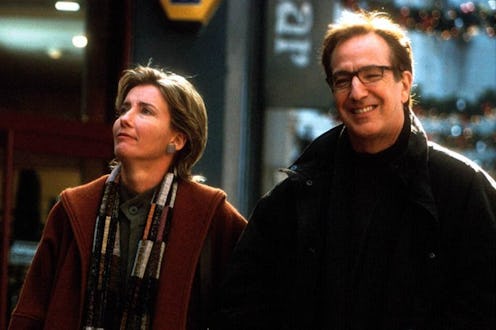
Two years ago, something peculiar happened. The film Love Actually accumulated more Internet searches in 2013 than any other year since its release, according to iQuanti, a data-driven digital marketing company. It reports, "Love Actually has periodically peaked in search interest in December of each year." This makes complete sense, as a Christmas movie will garner a lot of searching and discussion in the Christmas month — one could use that principal to determine that most horror movies tend to be most popular during October. But, in December of 2013, the film garnered a whopping 550,000 searches, the highest it hit before and since. So, what about 2013 made Love Actually so popular?
The easiest and most obvious answer is that 2013 brought about the 10-year anniversary of the film, however, there are far more factors at play than that. 2013 ended up being something of a perfect storm for Love Actually's resurgence in popularity. Not only did the film's stars have very good 2013s, but the anniversary led to a great deal of discussion — and even controversy — regarding the legacy that the film has left behind. Here are all the factors that led to 2013 being a peak year for the film.
Big Film, Bigger Actors
With an ensemble cast as strong as Love Actually, it was likely that even some of the smaller names in the film were going to go on to become huge stars. However, I don't think even director Richard Curtis himself could have predicted just how accomplished his cast would end up being. Many actors who got some of their earliest roles in Love Actually spent the following decade landing some amazing film and television roles.
- January Jones, who played Jeannie — one of the ditsy American girls whom ends up romancing Colin, would later go on to play the polar opposite of that role as the stern, barely together Betty Draper in Mad Men. The show premiered its sixth season in 2013.
- Andrew Lincoln, who played Mark — the videographer who was in love with Kiera Knightly's Juliet, went on to get the lead role in the much-beloved zombie series The Walking Dead. The show's fourth season premiered in 2013.
- Martin Freeman, who played porn stand-in Jack, starred as Bilbo Baggins in The Hobbit franchise. The Desolation of Smaug was released in December of 2013.
- Olivia Olson, who played the golden-piped Joanna, currently voices Marceline on the incredibly popular television series Adventure Time. In 2013, Adventure Time aired the majority of its 16-month fifth season.
- Chiwetel Ejiofor, who played Juliet's husband Peter in one of his earliest film roles, had an amazing 2013. His portrayal of Solomon Northup in 12 Years A Slave earned him a much deserved Oscar nomination for Best Actor, as well as many other nominations and wins from film institutions.
With a lot of these actors having peak years, it makes sense that this early-in-their-careers film would be searched frequently in 2013.
The Great Love Actually Debate of 2013
Many publications use anniversaries to look back on the legacy of a piece of media, be it film or music album or television show. When Love Actually's 10th anniversary came around, however, its retrospective wasn't an entirely positive one. An article by film critic Christopher Orr that ran in The Atlantic on December 6, 2013 claimed that the film "is emphatically, almost shockingly, anti -romantic." Orr's lengthy take-down of the film inspired a great deal of articles in response to his criticism — it seemed as though many publications' pieces about the article got shared on social media and 2013 was no longer a celebration of the film, but a discussion on whether the film deserves its legacy.
- Emma Green, also of The Atlantic, ran a counter-argument to Orr's article saying, "It's true we don’t see many long, relationship-building conversations between lovers. But it's valid for the film to portray the experience of falling for someone as mysterious."
- Alyssa Rosenburg, of ThinkProgress, also disagreed with Orr's view saying, "I like Love Actually not because I think it’s a compelling celebration of love, or because it’s a good holiday movie, but because of how sad the film often is."
- Ben Dreyfuss, of Mother Jones, tore down Orr's argument with claims like "Love Actually says, yes, you're crazy, but other people are crazy, too, and you should find out if maybe they're crazy about you."
- NPR also featured a discussion between two writers on the topic of Love Actually . In it, writer Jen Chaney said, "Very little in this movie is about love, at least the real kind. And that includes Colin Firth's decision to propose to a woman whom he has had no real conversations with, mere weeks after realizing his girlfriend has been sleeping with his brother."
While the "Is Love Actually a good movie?" debate rages on to this day, with valid arguments on either side, that fire never burned brighter than it did in December of 2013. Perhaps by the time its 20th anniversary comes around in 2023, people's thinking will shift to believing the film is wholly unredeemable, only for someone to write a think-piece for a prestigious publication claiming otherwise. Until then, get the tissues ready because chances are you'll be watching the film sometime this holiday season — and no matter what anyone says that Joni Mitchell scene still packs a punch.
Images: Universal, Giphy (3)